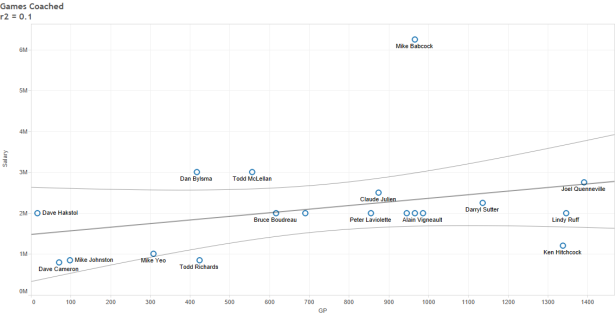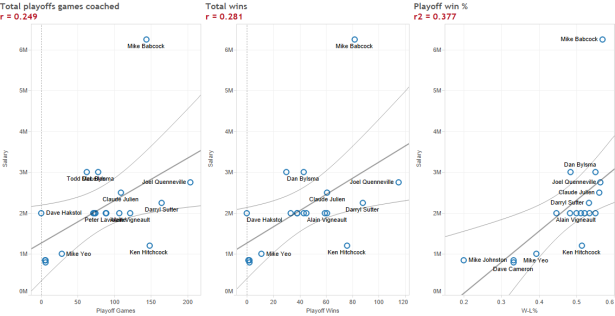This summer, the drama surrounding Mike Babcock drew my attention to the salaries of coaches in general. What factors play into how much money a coach earns? Babcock is known as a coach who’s won at every level. Are Stanley Cup wins a factor in what a coach gets paid? Maybe playoff wins? Regular season won-loss records? Something else?
Babcock’s contract – a mammoth 8 year long pact worth $50 million to coach the Leafs – brought the subject of coaching salaries to the forefront. At $6.25 million per season, Babcock earns more than double the annual pay of any other NHL coach with a publicly known wage.
For the Leafs, spending huge amounts of cash on team personnel makes sense – there’s no cap on coach salaries so that Leafs can wield their monetary advantage to sign the best bench boss available. For Babcock, it’s difficult to fault the long-time Red Wings coach for taking the big pay day. Beyond enriching himself (which he really, really did), Babcock has been very open about his desire to push coach salaries forward by setting a new standard. He probably didn’t imagine he’d earn more than Joel Quenneville and Darryl Sutter combined or that his term would extend three years past any other NHL coach. But, as perhaps the game’s best coach, the Leafs were willing to pay whatever was needed to pry Babcock out of Detroit.
But what types of thinking go into deciding how much a team is willing to pay its coach? Did Babcock earn the money because of his vast experience? Or maybe his excellent regular season record over a decade in Detroit? What factors correlate with coach salaries?
Reference and Method
Well-sourced and organized coach salary data is not widely available. Capfriendly.com has gathered publicly shared coach salary information here. The site only has information for 18 of the NHL’s 30 coaches that are currently active. This makes an already small data set even smaller and this is important to keep in mind as we go. Todd Richards and John Tortorella have split the job in Columbus this season – both are included here, which means this sample has 19 coaches.
Before we get started, here’s a look at who’s involved and what they earn.
There are some definite tiers in coach wages – around $1 mil/yr, $2 mil/yr, and then an upper tier that is hyper-inflated by Babcock’s annual stipend. It bears repeating that 12 coach salaries are missing. I’ve read rumours here and there (Patrick Roy in the $2 mil/yr range, Trotz in the upper tier near the salaries of Bylsma and McLellan. Etc…) But these reports aren’t backed up by beat reporters, at least not publicly.
Last preamble note – all coach data is drawn from hockey-reference.com here.
What I found
Wins and experience don’t correlate with pay
I started by testing the notion that general managers probably hire coaches with experience and strong credentials whenever possible. Potential measures of these qualities might include regular season wins, games coached, or years of NHL service. Here’s how each of these factors fared:
With an r-squared value of about 0.128, regular season wins explain very little of the salary differences between the active NHL coaches in question. And yes, Mike Babcock breaks this chart and every other one to follow.
In correlation with coach salaries, the number of NHL games coached carries an r-squared value of ~0.1. Years of experience is extremely similar, which makes sense. The r-squared value there is 0.081. So time spent in the NHL doesn’t connect with better pay for this cohort of coaches. The poster child for this is Ken Hitchcock. Somehow, Hitchcock seems to be on the verge of losing his job each year and isn’t well-compensated. He’s coached more than 1300 NHL games and earns less than NHL newcomer Dave Hakstol.
Team Revenue Effects
Team value is tied closely to coach pay
While researching factors tied to coach salaries, cap specialist Carolyn Wilke suggested looking at team revenues for links to coach pay (as an aside, Carolyn has written a highly read-worthy post on coach and GM effects – have a look here).
For figures on team values, revenue, and operating income, I draw on Forbes’ report from late 2014 – “The Business of Hockey.”
*for a full view of these charts and the others used in this post, check here.
Carolyn’s intuition proved to be insightful. While team revenue registered a r2 value of only 0.181 – more related to coach salary than regular season wins but still not a strong connection – operating income and team value fared much better.
Teams with higher operating incomes (think Leafs, Blackhawks, Rangers) tend to have higher paid bench bosses. Teams with lower operating incomes (think Blues, Blue Jackets, Wild) tend to pay less for their head coaches. Overall, the r2 value is 0.25, the fourth-highest correlation I found.
Better still, coach pay shows a correlation with team value – a r2 value of 0.351. Teams that ranked near the top of the Forbes valuation list – Leafs, Rangers, Canadiens, Bruins, Flyers, etc…) tend to pay their coaches a premium. Coaches in the league’s biggest markets – Babcock in Toronto, Claude Julien in Boston, Darryl Sutter in Los Angeles – are paid better than their average brethren. Teams with the lowest values – clubs like the Wild and Blues – are paying their coaches less.
Of all factors related to coach pay, team worth finishes as the second highest correlation. To the extent that it’s possible to read an explanation out of this, one could argue that the richest teams treat their head coaching role as a prestigious occupation worthy of above average compensation.
Alternatively, one might argue that teams with the highest financial value come with additional market or managerial requirements (i.e. rabid fans and massive throngs of reporters in Toronto, Montreal, or Boston). Due to the extra pressure or effort required, teams in these markets offer better salaries to compensate coaches for their work, almost like danger pay.
Most likely, teams with the greatest values just have more cash to spend. Coaches, trainers, specialists, scouts, etc… aren’t subject to salary cap restrictions so big market teams pay more to bring in their preferred staff.
Playoffs
Get to the playoffs, get paid
Team worth and operating income are correlated with coach pay but nothing compares with playoffs as a correlate for pay when examining the available coaching data.
I examined playoff games coached, playoff wins, and playoff win percentage separately to identify the specific factor most connected with a coach’s salary. Win percentage showed the best correlation with coach salary of any measure I tried – an r2 value of 0.377. Playoff wins came in at an r2 value of 0.281. Total playoff games, 0.249. Of the data I examined, these factors were the first-, third-, and fifth-most related to coach salary.
For example, Quenneville, Julien, Bylsma, and McLennan have each coached teams that have won Stanley Cups (Coach Q, Julien, Bylsma), or log some playoff games every year (McLellan and the poor old Sharks).
However, it isn’t fully appropriate to separate these three factors out. Playoff games and wins have an r2 value of ~0.99, and win%/win and games/win% both register r2 scores of about 0.6. More playoffs games, wins, and winning percentage are highly overlapping. The safest comment to make is this: A coach who has a lot of playoffs experience is going to get paid. And if a battle-tested coach and a highly valued team meet to discuss a head coach vacancy, that perfect storm may create a Babcock Effect.
Some closing thoughts
In order, the top five factors most correlated with a coach’s salary are:
Here’s the key takeaway – big budget teams will pay up for coaches who have won in the playoffs.
Some questions
While wrapping this piece up, an HG colleague suggested that a coach’s prior pay might be the factor most correlated with a coach’s current pay. This may well be true but, due to a lack of available data on prior contract details for coaches, this question is very difficult to explore for now. This snapshot of coach data should help to make exploring that hypothesis possible in the future.
Another potential argument here is that coach salaries are simply increasing over time. Babcock, Bylsma, and McLellan are the highest known coach wages and all three signed on this summer.
Though there’s something to that thought, Dave Cameron (re-signed with the Senators in 2015), Mike Johnston (Penguins, re-signed in 2014), and Ken Hitchcock (Blues, 2015) are among the lowest-paying coach contracts despite being signed recently. Salaries are rising for elite coaches that join rich clubs. But for coaches with less playoffs time or in smaller markets, that pay raise has yet to come.
For more information…
I’ve created a viz with all available coach data. You can find it here.









Reblogged this on Hockey Graphs.
There is another salary I can provide to you to add to your data points. Jeff Blashill, Babcock’s replacement in Detroit, is earning $400,000. He signed a 3-year contract extension last year when the Wings wanted to retain him in the event Babcock left. You can find this sourced in the final paragraph of this article: http://www.mlive.com/redwings/index.ssf/2015/06/jeff_blashill_officially_named.html
Seems to go along with the pattern we’re seeing so far. Thanks for sending this along – will definitely add to an update.
r^2 measures the variance in the data, “what percentage of the variance in the data can be explained by the model” it does not necessarily imply correlation in the way you are describing. all you are really saying is ‘which factor looks the most linear when compared to coaches salary’ but i do find your article really interesting! and also another interesting question to ask i think is, “are the best coaches paid the most?”